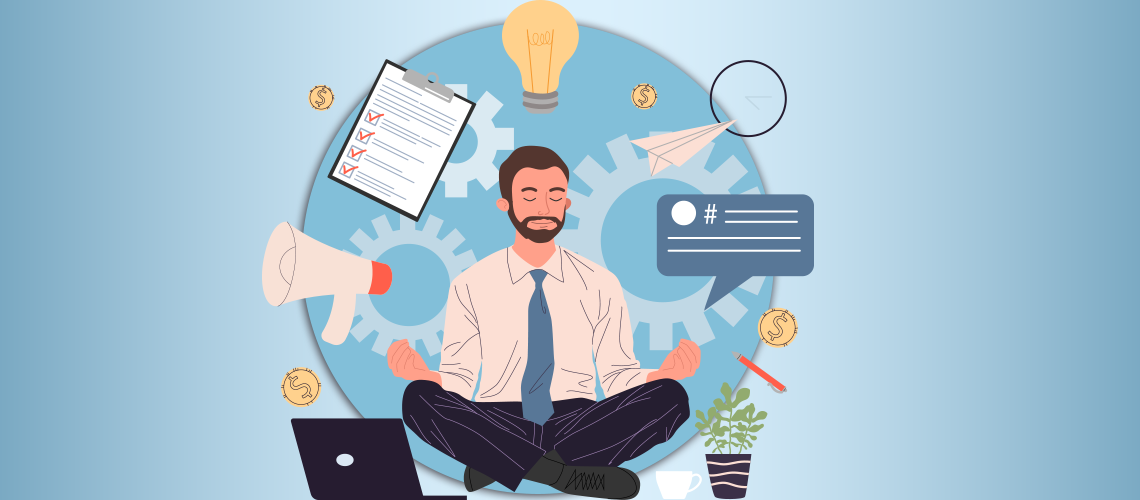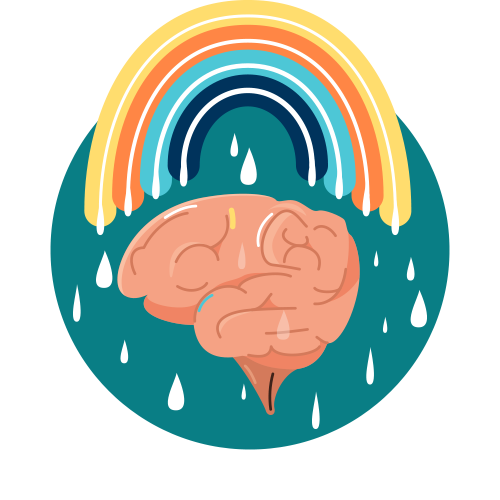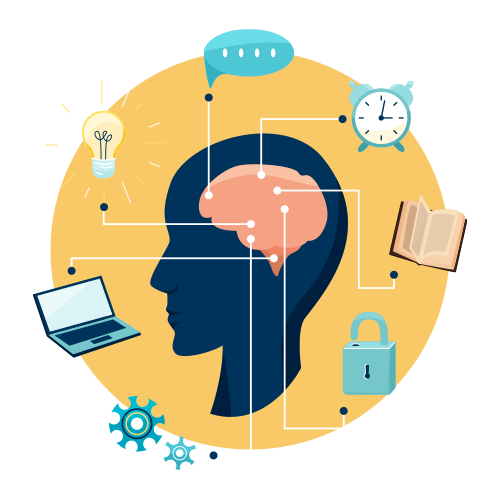- What is mindfulness?
- How can mindfulness help your small business?
- How can a virtual receptionist help you be more mindful?
Q: Is being mindful while at work beneficial for small business owners?
A: Being mindful at work has numerous benefits for small business owners. Mindfulness helps you be more productive and engaged while also reducing your stress. This article explores how you can incorporate more mindfulness at work.
These days it seems like everyone is talking about mindfulness. Mindfulness practices are employed across a wide range of demographics. There’s got to be something to it, right?
The concept is quite simple: being present, slowing down, focusing on what you’re doing at the moment. But putting it into practice can prove much more difficult.
This is particularly true when it comes to the workplace. Mindfulness at work is one of the areas that constantly frustrates even the most dedicated of practitioners.
The good news is, there’s hope.
If you’re a small business owner looking to improve your productivity and decrease your stress, mindfulness is just what you need. Here’s how you can put it into practice.
- What is mindfulness?
- What are the benefits of mindfulness?
- How can you increase mindfulness at work?
- How can a virtual receptionist help?
What is Mindfulness?
According to mindfulness.org, “mindfulness is the basic human ability to be fully present, aware of where we are and what we’re doing, and not overly reactive or overwhelmed by what’s going on around us.”
In other words, mindfulness is being in the moment. It’s focusing on what you’re doing in the here and now.
Learn More: Regain Control of Your Wellbeing With This Science-Backed Strategy | The Future of Work Podcast from Allwork.Space
While that might sound incredibly simple, further inspection reveals just how little most people are actually fully present.
In the modern world, we face a host of distractions.
Our phones are always ready to provide us with a slew of content and notifications. Even if we aren’t on our phones, we often let our minds wander to future tasks or past events rather than staying firmly rooted in the task at hand.
This is why practices like mindfulness meditation exist. Most of the time it takes a bit of training before we’re able to stay fully present.
Activities like meditation function to teach us to engage more fully with the moment we’re in.
Don’t worry!
You don’t have to be a certified Zen Master or expert in meditation to take advantage of basic meditation and mindfulness techniques.
Dr. Cortland Dahl, an expert in this area and Research Scientist at The Center for Healthy Minds at the University of Wisconsin-Madison, shared how simple mindfulness and meditation can be on a recent podcast:
“From what the science shows us in this area is that meditation is to the mind what exercise is to the body,” Dr. Dahl explained.
“You can literally train your mind in a moment. So right now, as you’re listening … anybody who’s listening to this, just notice how your breath feels in your body. So, can you feel some sensation associated with your breath? Yeah. You’re meditating. “
What Are the Benefits of Mindfulness?
Mindfulness has a host of benefits.
One of the most obvious and most sought-after is the effect mindfulness has on stress. Mindfulness helps reduce stress by keeping the practitioner from focusing on future to-dos.
If you’ve ever found yourself staring at a laundry list of tasks and began to feel hopelessly overwhelmed, you probably understand why.
Thinking about all the things you’ll have to do in the future can make it feel impossible to handle everything on your plate.
Mindfulness helps counteract this by keeping you focused on one thing at a time.
Whether you’re working or relaxing, being mindful of your experience prevents panic and lets you live in a calmer space.
Additionally, mindfulness can help you enjoy experiences more.
If you’re on a vacation but constantly worrying about whether or not you left the light on before you left home, your experience is going to be significantly diminished.
Mindfulness helps you connect with what you’re doing so you can more fully enjoy it. This can make your subjective experience more full and enjoyable.
Finally, mindfulness can help you be more effective and creative. Because you’re able to fully engage with whatever you’re doing, you are more likely to notice how you could improve.
Over time this can help you learn how to better perform tasks.
How Does Mindfulness Relate to Work?
As you can probably imagine, mindfulness at work has a host of benefits.
Research from multiple companies has shown that mindfulness helps prevent chronic stress in practitioners.
While meditation, yoga, and other Eastern traditions used to be difficult to access and utilize, now the market is flooded with apps for smartphones that enable users to quickly jump into 5-minute silent or guided meditations.
Anywhere the internet is available, small business owners can find Ivy League college courses on mindfulness meditation, stream TED Talks about its usefulness in our fast-paced society and the hectic pace of work.
Harvard University offers a course called Mindfulness, Meaning, and Resiliance that describes how being mindful can help build resilience.
Mindfulness is a way of attending to the experience of the present moment with full awareness and without judgment or reactivity
Podcasts too many to name focus on spirituality, mindfulness, slowing down, practicing awareness, and pontificate to busy professionals about the benefits of stillness and breathwork. Yoga studios can be found in nearly every city and suburb.
With so many options, there has to be something to this often overused term.
Right?
Some common benefits:
Staying engaged with the present moment prevents chronic stress from accumulating. Instead of getting overwhelmed by long to-do lists, mindful workers can simply focus on the task at hand.
Not only does this keep them from experiencing an unhelpful sense of dread about the future, but it also keeps them moving forward, helping them cut down on the list of tasks they have to accomplish.
Being mindful also allows you to pivot more effectively. This is an especially useful skill for small business owners.
Small business owners have to perform a wide range of tasks.
When having to switch focus on a dime, mindfulness can allow them to engage faster and be more effective, rather than wasting time and energy bouncing between tasks in their heads.
This can have a significant impact on business growth over time. It allows you to bring your best to each project throughout the day while also allowing you to get more done in the same amount of time.
Finally, encouraging mindfulness can help draw in talent as your business grows.
Millennial workers expect different things from the workplace than previous generations. One of the top areas of emphasis is on work/life balance.
By helping keep worker stress down and encouraging psychological wellbeing, mindfulness in the workplace can make your business an appealing place to work for bright young employees.
How Can You Increase Mindfulness at Work?
So, how do you stay mindful at work?
One of the best ways to practice mindfulness at work is to practice mindfulness outside of work.
Mindfulness is a skill. The more you practice, the easier it becomes.
As such, taking the time to pause, meditate, and enjoy the present moment when you’re off the clock will help train you to do the same at work.
That said, there is still plenty you can do when working to stay mindful.
One such option is to take regular breaks and incorporate short meditation practices into your work schedule.
These breaks serve to recenter you. This in turn keeps you from succumbing to stress as the day proceeds.
You can also use your standard breaks to increase your mindfulness. Eating your lunch mindfully or taking a short walk for fresh air during your breaks can go a long way.
Perhaps the biggest key to staying mindful is to stop multitasking. When you try to accomplish two tasks at once, you inevitably lose some of your ability to concentrate.
This can make you feel more overwhelmed, diminish the quality of your work, and make you less effective throughout the day.
How a Virtual Receptionist Can Help
One of the biggest intrusions into mindful work is the constant ringing of your business phones.
You may be deep into mindfully working on a project when the phone rings. If you’re handling your business phones yourself, you have to answer.
If this occurs multiple times a day, it can seriously impede your ability to stay present and focus on one project at a time.
Luckily there’s a solution that is both convenient and affordable.
A virtual receptionist can eliminate intrusive calls no matter where you are. They operate remotely, answering all incoming calls for you and forwarding any messages along.
By hiring a virtual receptionist, you free yourself from having to monitor your phones, ensuring you can stay completely present without missing out on sales or business connections.
Read More: 10 Reasons Why You Shouldn’t Use Your Personal Phone for Business
By sending along any messages in a convenient format, virtual receptionists also allow you to interact with your callers in a more mindful way.
You can call or message back when you have the time and energy to do so, rather than having to juggle your response with other tasks you’re working on.
This helps you build better connections with your callers, ensuring you put your best foot forward when representing your business.
Conclusion
While simple, in theory, mindfulness can be difficult to practice. The modern workplace makes it difficult to stay completely present with the task at hand.
That said, it’s worth incorporating more mindfulness at work. Doing so has benefits both for your subjective wellbeing and for your productivity and business growth.
Alliance Virtual Offices live receptionist plans can help you stay present and focused on your work by eliminating distracting business calls.
You’ll gain access to a professionally trained receptionist, ensuring your callers receive excellent customer service while freeing you to stay present with your projects.







